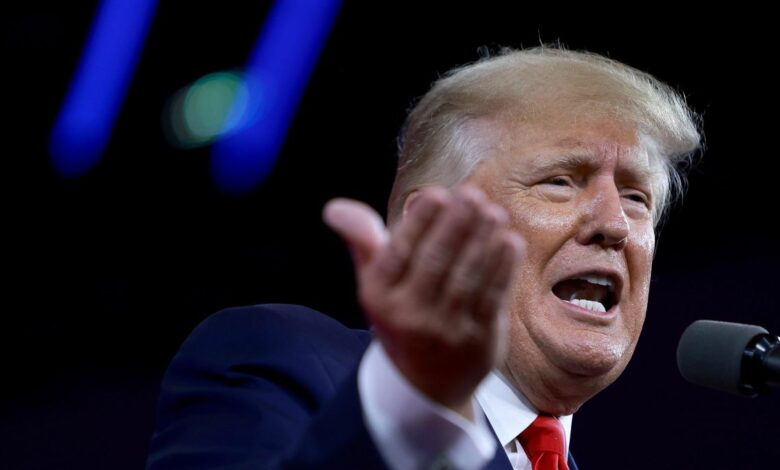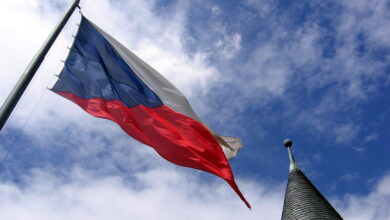
(CNN)- A fresh tide of extreme populism — feeding on economic strain, hostility to immigrants and cultural warfare — is challenging key democracies from the inside at the same time Russia escalates the most brutal assault on the liberal Western order in decades.
In France, the United States, Hungary and elsewhere, the center seems to be dropping out of politics as moderates lose ground to radicals on the right and the left, amid widespread public discontent after a two-year pandemic that saw governments significantly curtail individual freedoms.
Only 17 months ago, a US campaign won by a veteran establishment politician — President Joe Biden — who had campaigned as a moderate against a wannabe authoritarian — Donald Trump — appeared to herald the end of the road for the former commander in chief’s populist crusade.
Yet Republicans, still in thrall to Trump — many of whom have signed on to his corrosive lies about election fraud to win the favor of his supporters — appear on course to capture the House, and perhaps the Senate, in midterm elections in the fall.
They are capitalizing on deep frustrations around the country over rising prices and high gasoline costs that Biden has been unable to stem. Many are also staking out fiery messages on racial, gender and LGBTQ issues and immigration, implying that traditional American culture is at risk of being destroyed. That theme dominated the Supreme Court confirmation hearings for Judge Ketanji Brown Jackson.
In France, President Emmanuel Macron — the epitome of technocratic elitism — now faces a tough two-week fight to beat back the momentum of the anti-immigrant, anti-Islam and pro-Putin far-right candidate Marine Le Pen.
The pro-Trump wing of European politics racked up one victory that would have pleased Russian President Vladimir Putin after Hungarian Prime Minister Viktor Orban — a scourge of press freedom, EU leaders and democratic values — kept his job in a landslide election win earlier this month. Orban, a favorite of the “Make America Great Again” movement and conservative TV pundits, profited from his own gerrymandering of electoral districts and friendly propagandists in the press to defy predictions that his appeal was fading.
Trump’s continued hold on Republican politics, Orban’s victory and Macron’s tight reelection race underscore how the established structures of democracy in Western nations remain vulnerable — not just from hostile outside forces like Putin’s election meddling but also from a perception that traditional politicians are unable to solve people’s problems.
A rush to the political extremes
The worst predictions of Macron’s performance in the first round of the election didn’t materialize as he won by about 5 percentage points. But his lackluster campaign gave Le Pen an opening to brand the President, who has always struggled to show he understands voters’ economic difficulties, as indifferent to high inflation and energy prices.
As he trained his sights on the second round of his election race, Macron styled himself as a bulwark against populism and extremism inside France and abroad.
“I want France to be part of a strong EU, continuing to create alliances with the great democracies of the world to protect ourselves,” the French President said after the first-round result.
“I do not want a France that leaves the EU and only has international populists and xenophobes as allies. That is not us.”
After the effective disappearance of the center-right opposition in French politics, around 50% of the vote went to radical parties of the right and left.
In some ways, this parallels the eclipse of moderate Republicans in Washington by Trump’s authoritarian America First-ism. In the US, Biden won in 2020 by courting the moderate suburbs, but progressives succeeded in tugging his presidency to the left once he was in office in a way that may have alienated more centrist voters.
Le Pen has worked to paper over her past support for Putin and her vows to pull France out of the European Union. But if she were to pull off a surprise victory, the anti-Putin coalition in Europe would come under severe strain, and the Russian leader would have a fresh opportunity to carve new divides among the allies. Macron has been especially prominent in the Ukraine crisis, keeping open lines of communication with the Kremlin but also emerging as Biden’s most important ally in Europe.
“Putin’s invasion of Ukraine strengthened the West as never before since the Cold War. The world is now divided between those countries that defend the rule of law and democracy and those that fight to end them,” said Nicholas Dungan, an Atlantic Council senior fellow who teaches at Sciences Po, a prestigious French research university. Still, Macron’s first-round victory and newly energized rhetoric offered the prospect that he could be a dam against extremism, at least in France.
“Today we have some minor relief that we will be able to count on French leadership in the future,” Dungan said after Sunday’s results in an election that had been watched with some anxiety among Biden administration officials.
Still, no one who worries about the threat that extremism poses to democracy — a core theme of Biden’s presidency — is taking a second-round Macron victory for granted.
“The far right has never been so close to winning,” said defeated French Republican candidate Valerie Pecresse.
In 2016, the populist revolt that saw Britain vote to leave the European Union was a canary-in-the-coal-mine moment that foreshadowed Trump’s outsider crusade that crushed Democrat Hillary Clinton’s White House hopes.
Six years later, there appear to be ill omens for Democrats across the English Channel. Le Pen was able to energize her campaign, holding multiple rallies in rural areas, by highlighting the punishing toll of inflation that pushed up the cost of living and was exacerbated by the economic impact of the war in Ukraine.
Biden, who repeatedly told Americans that inflation was a “transitory” issue coming out of the pandemic, has tried hard to show the country he understands its effects. But he could pay a heavy price in November’s midterms if already disgruntled voters are still furious about their grocery bills.
Power based on big lies
Trump, Le Pen and Orban don’t come anywhere near the depravity and violence of Putin, who is perpetrating atrocities in Ukraine on a scale not seen since at least the Bosnian war and probably since World War II.
But the tactics of many of the anti-establishment politicians stem from a similar well of political toxicity. They rely on whipping up anger over economic conditions into resentment of foreigners, Muslims and outsiders, including other minority communities. Some concentrate on eroding the reputation of democratic systems and a free press to build power. Anything that increases the cynicism of the electorate about its rulers and the system that keeps them in place creates a new pool of anger that can be exploited.
Voter suppression eroded democracy in Russia and Hungary, and it’s doing the same in the US. It’s not certain that Trump’s extremism will provide a path to power among a diverse general electorate. But he remains the dominant figure in his party and the front-runner for the 2024 GOP presidential nomination.
Trump’s entire political project — one that incited an unprecedented assault on the US Capitol on January 6, 2021 — is now based on a big lie: that the US election was rigged in 2020.
The more outrageous the lie, the more it can be weaponized for a politician’s nefarious means. Putin’s rationale for invading Ukraine — that the country is under the grip of Nazis, when in reality it has a democratically elected, Jewish President — springs from the same well of dangerous fantasy politics.
The onslaught was motivated by Putin’s belief that the country did not have the right to exist as an independent, sovereign state and that its people were essentially Russians. But it was also brewed from more than 30 years of the Russian leader’s festering resentment of the West and its political systems following the fall of the Soviet Union after the Cold War.
The Russian President launched his own direct effort to disrupt US democracy with his intervention in the 2016 election in the United States, which US intelligence agencies assessed was designed to help Trump win. Those same agencies warned on Monday that US pressure on Russia over the Ukraine invasion could prompt Putin to go even further in meddling in US democracy in the future.
But it was Ukraine’s open desire to solidify its democracy by joining the West — it wanted membership in the European Union and NATO — that finally pushed Putin over the edge and precipitated his onslaught.




